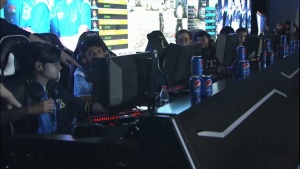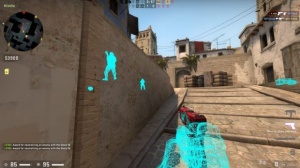Cheating in eSports
Cheating in eSports entails using unauthorized entities, virtual or physical, in order to gain an advantage over their opponents or for personal gain. Examples of such entities include unauthorized software, hardware modifications, and performance-enhancing drugs. Other, less direct types of cheating include breaking a game's Terms of Service (TOS) and match-fixing. As videogame competitions start to gain popularity and prize pools keep increasing, cheating has become much more prevalent. Most major competitive titles have their own cheat-detecting systems. Notable examples include Valve's Valve Anti Cheat (VAC), BattlEye, and Easy Anti-Cheat.
Contents
Explicit Cheating
Software
Cheating via the use of software implies that the player uses unauthorized third-party programs that enhance their performance. This is the most prevalent type of cheating in eSports and game developers have taken measures to discourage the use of third-party software. Modern anti-cheats identify all types of third-party software, even if they are not intended to be used as cheating mechanics. Sanctions for using unauthorized software vary by severity and among game developers, too.
Wallhacks allows players to see the silhouettes of all players through environmental terrain. These types of hacks provide an advantage to the user by providing vital information about the location of enemies at all times. If the software passes the anti-cheat check, it is hard to detect if a user is using this type of exploit. In these cases, detecting players with this exploit revolves around a "reporting" feature, where players can report a suspected cheater, which will then be reviewed by a human individual. Players convicted of using wallhacks are usually given a suspension from the game, where the duration is determined by the severity and usage of the software.

Aim assistance, usually prevalent in shooting games, enhances its users' aiming capabilities. This removes the need to practice aiming, as the software will help the user lock on to their targets. Aim assistance software comes in various forms. The most prevalent type is aimbots, which keep a player's crosshair locked on to their targets, usually towards their head. Aimbots are easier to detect, usually by spectating a suspected player. Similar to aimbots, triggerbots assist a player with target acquisition. However, unlike aimbots, triggerbots do not keep a player's crosshair locked. Instead, triggerbots automatically shoot when a player's crosshair is over an enemy target. Triggerbots in certain games, such as Counter-Strike: Global Offensive, can also automatically stop your movement prior to shooting in order to guarantee the accuracy of the shot. Sanctions for using aim assisting software are usually permanent bans. Valve's VAC system places a "VAC" ban on a player's account, which disables them from playing in any VAC-secured server, including numerous tournaments.
Distributed Denial-of-Service(DDoS) attacks: involve sending high amounts of traffic to game servers in an attempt to disconnect opponents by crashing their game. Players affected by DDoS attacks experience lag and game instability, which can seriously hinder their in-game performance. Although this is not generally a problem in LAN environments, DDoS attacks are more often seen in online matchmaking. Certain game developers, such as Ubisoft, have taken legal action against hackers who use DDoS attacks in their online matchmaking. [2]
Scripting/Macros is a series of commands run in quick succession, usually through a text file. Since these commands are executed faster than the actions of a human being, using scripts/macros provide an unfair advantage. Players can also write scripts to create bots that perform sequential tasks. Notable scripts include bunnyhop scripts in the Counter-Strike series, which allow a player to move at speeds faster than running, and rapid-fire scripts, which attempt to register multiple mouse clicks in order to shoot faster in other games. It is important to note, that many scripts are used to make a challenging task possible, such as in the case of the bunnyhop script. Many players have mastered bunnyhopping through practice. Because of the high skill cap for this feature, running a script allows any player to perform the bunnyhop. Scripts/Macros are generally seen in massively multiplayer online role-playing games (MMORPGs) as these games often involve completing tasks repeatedly in order to progress through the game. Some players resorted to creating bots that replicate these tasks in order to advance faster through the game. Sanctions vary on the severity but usually result in a permanent account ban in MMORPGs.
Real-life
Substance abuse involves players taking performance-enhancing drugs in order to gain advantages over their opponents. Commonly referred to as "doping", players generally consume stimulants like Adderall. Notable cases include "Semphis" from Cloud9 admitting that he and his entire team had consumed Adderall to improve their performance at ESL One Katowice 2015. [3] As doping grew in popularity, many tournament organizers required players to take drug tests prior to the tournament or after unusual results. [4]
Implicit Cheating
Due to the blatancy of explicit cheating, many professional players at the highest level of play tend to resort to implicit cheating in order to gain an advantage over their opponents. Unlike explicit cheating, implicit cheating requires more creativity in order to circumvent game rules and mechanics. Implicit cheating generally requires careful planning among multiple parties in order to be executed successfully. Cases of implicit cheating are usually exposed by other players' observations and cheaters unknowingly exposing themselves.
Teaming
Cheating via teaming has become popularized in certain videogame genres, such as Battle Royales. Since most eSports titles involve only two teams competing against each other, teaming is generally not observed in such games. Teaming is usually defined by the game's developer, which can vary across games. A notable example of teaming was seen in the Fortnite World Cup Qualifiers Week 3, where "Ronaldo" and "XXiF" were accused of being fed kills by their friends in order to maximize their points. Teaming in these Qualifier weeks could secure them a spot at the Fortnite World Cup, which had a prize pool of $30,000,000 USD. Players were guaranteed $50,000 USD in prize money just by qualifying and attending the event in New York City. Both players were given a two-week ban by Epic Games, but qualified for the Duos portion of the World Cup on Week 8. [5] [6].
Collusion
Unlike teaming, collusion takes into account any type of tampering within a game. Under these definitions, teaming can be classified as a subcategory of collusion. A recent example of collusion was seen in the Fortnite Championship Series: Chapter 2 Season 2, where Epic Games defined collusion as "work[ing] together to deceive or otherwise cheat other players during any match". Examples of collusion for Epic Games' Fortnite included: [7]
- Teaming: Players working together during the match while on opposing teams.
- Planned Movement: Agreement between 2 or more opposing players to land at specific locations or to move through the map in a planned way before the match begins.
- Communication: Sending or receiving signals (both verbal and non-verbal) to communicate with opposing players.
- Item Dumping: Intentionally dropping items for an opposing player to collect.
Epic Games banned 4 players for 60 days each. The banned players, "Kreo", "Bucke", "Keys", and "Slackes" were allegedly damaging each other in a controlled manner in order to bypass a game mechanic, effectively providing them an advantage in late-game situations. [8]
Match-Fixing
Match-fixing is the agreement of the result of a game between two opposing teams prior to the start of the match. Because only one team is guaranteed to win, match-fixing usually benefits both teams in different ways. The losing team usually receives some monetary compensation. A notable example was observed when iBUYPOWER and NetcodeGuides.com played at CEVO Professional Season 5 for Counter-Strike: Global Offensive. Both teams had agreed that iBUYPOWER would purposefully lose the match. Members of iBUYPOWER placed bets against themselves on csgolounge.com, a popular betting site for Counter-Strike: Global Offensive. These bets would've given the players a total of $10,738.26 USD in winnings. Before the bet was processed, the site suspected suspicious actions, and it was later revealed that iBUYPOWER had participated in match-fixing. [9] All of the players involved in the scandal were given lifetime bans from Valve-sponsored Counter-Strike: Global Offensive tournaments.
Ethical implications
Reasons
The reasons for cheating can vary greatly between players, some reasons include:
- Players are stuck at a particular point in a competitive videogame, such as a specific rank
- Players want a feeling of "power" and/or "superiority"
- Players just want to make their opponents lives' miserable for that one match
- Players try to climb the leaderboards
- To try to gain monetary compensation (i.e cash prizes)
- To gain notoriety
Mia Consalvo, a professor at Concordia University in Montreal, Canada, has done some research into why people cheat at videogames. In Chapter 4 of Cheating: Gaining an Advantage in Videogames (2007), she interviews around 23 gamers as to why they cheat. Although none of them were good enough to compete at a professional level and most played casual and/or singleplayer games, a couple of people gave their explanation as to why they cheated in an online environment. Pete (22) stated that he cheated in Diablo II because "[he] likes to have any possible advantage against people who do not necessarily want to play fair with him". Others, such as Tim, just "wanted to feel like being a jerk online". [10]
"Mob mentality"
Most competitive players aspire to reach the highest level of competitive play in any game that they play. However, it takes immense dedication, skill, and patience to arrive there. Certain players who still want to attain that goal might look for alternative routes that will get them there faster, which may include cheating. In certain titles, cheating at the highest level is so prevalent that it has become a "norm" for top-ranked players to be cheating in some form. Game developers may or may not be aware of this, but they do not enforce or create restrictive rules regardless.
Discouragement of high-ranked players
Although cheating might be common among top-tiered players (top 1%), cheating is rampant among higher-ranked players, which usually comprise the top 20% to top 15% of the game's player base. The high incidence of cheating among these ranks might discourage other players in the same rank to stop playing that game, as they are unable to compete with them, thus, becoming stuck to their ranks.
See also
- Apex Legends (game)
- Cheating in Videogames
- Counter-Strike: Global Offensive (video game)
- League of Legends
- Mia Consalvo
- PlayerUnknown's Battlegrounds
References
- ↑ CS:GO professional player caught cheating gets five-year ban. Retrieved from https://www.polygon.com/2018/10/25/18023236/forsaken-cs-go-cheating-optic-india-ban
- ↑ Rainbow Six Siege's Ubisoft to take legal action against hackers. Retrieved from https://www.polygon.com/2019/9/19/20873889/rainbow-six-siege-ddos-attacks-ban-multiplayer-pc-ps4-xbox-one
- ↑ "Semphis" admits Cloud9 used Adderall (Interview). Retrieved from https://www.youtube.com/watch?v=XFMY5RQxCpw&feature=youtu.be&t=464
- ↑ "Device" from Astralis gets drug tested after they beat SK gaming 2-0. Retrieved from https://www.dexerto.com/csgo/professional-csgo-players-were-tested-for-performance-enhancing-drugs-at-the-esl-pro-league-season-7-finals-86397
- ↑ "Ronaldo" and "XXiF" banned for teaming on Week 3. Retrieved from https://www.polygon.com/2019/5/3/18528254/fortnite-xxif-cheating-teaming-world-cup
- ↑ "Ronaldo" and "XXiF" qualify for the World Cup on Week 8. Retrieved from https://www.polygon.com/fortnite/2019/6/3/18650397/fortnite-world-cup-duo-banned-qualification-xxif-ronaldo
- ↑ FNCS Chapter 2 Season 2 Official Rules. Retrieved from https://www.epicgames.com/fortnite/competitive/en-US/news/fncs-chapter-2-season-2-official-rules
- ↑ Epic Games bans 4 players for collusion in FNCS. Retrieved from https://www.reuters.com/article/esports-fortnite-ban-teaming/reports-epic-suspends-4-for-teaming-during-fncs-idUSFLM5lSyhp
- ↑ iBUYPOWER match-fixing scandal. Retrieved from https://dotesports.com/counter-strike/news/match-fixing-counter-strike-ibuypower-netcode-guides-1256
- ↑ Retrieved from Mia Consalvo. 2007. Cheating: Gaining Advantage in Videogames. The MIT Press.

